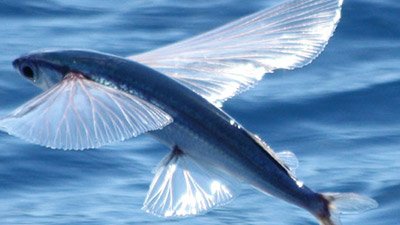
Leaping Fish Seen as a Successful Transitional Creature
Leaping blenny leads the way to land.
News Source
- Earth Times: “The Jumping Fish with a Tale of the Earliest Land Creatures”
Many fish have an amphibious streak in their behavior, but the Pacific leaping blenny is “one of the rare living examples of a fish that spends the vast majority of its time on land.”1 The blenny is native to intertidal zones on the rocky coasts of Micronesia. Because the blenny has “made a highly successful transition to land,”2 Dr. Terry Ord spent some time observing the blenny’s behavior hoping to discover some evolutionary secrets of our aquatic past.
“The Pacific leaping blenny offers a unique opportunity to discover in a living animal how a water-land transition has taken place,” says Dr Ord.
We know that our ancient ancestors evolved originally from lobe-finned fish but, today, all such fish are fully aquatic. Within the blenny family, however, are species that are either highly terrestrial, amphibious or entirely aquatic. Remarkably, representatives of all these types can be found on or around Guam, making it a unique evolutionary laboratory.
The fish of course does not have lungs and therefore must “stay moist to enable it to breathe through its gills and skin,” Ord explains. Blennies also do not have limbs but manage to squirm around on the wet rocks. Ord adds, “I can tell you they are very hard to catch and are extremely agile on land. They move quickly over complex rocky surfaces using a unique tail-twisting behaviour combined with expanded pectoral and tail fins that let them cling to almost any firm surface. To reach higher ground in a hurry, they can also twist their bodies and flick their tails to leap many times their own body length.”
Blennies do not voluntarily return to the water, avoiding submersion in spite of the incoming waves. Male blennies are territorial and try to attract females to their rock holes. In fact, blennies must restrict almost all their activities “to a brief period at mid-tide.” Then the water is high enough to keep them moist but low enough to keep them from being swept out to sea.
Dr. Ord believes that these fish “provide a unique opportunity to study the various steps—essentially ‘evolutionary snapshots’—in the invasion of land by marine fish as well as the selection pressures faced at different stages during a major ecological transition.”3 But she says the blennies’ territorial possibilities are quite “constrained by their evolutionary history.”4
By evolutionary standards, the blenny’s move toward land should have provided a survival advantage if those adaptations were to be preserved. Instead, the “evolutionary” changes evidently restricted this fish to a very limited survivable environment. Dr. Ord admits, “At the end of the day, they are still fish, and fish are more suited to life in water, not on land.”5
The blenny is not making any evolutionary progress toward becoming a terrestrial creature. It does not have lungs. It does not have legs. Nor does it have the beginnings of them. It is breathing using the same anatomical equipment God equipped aquatic creatures with on the fifth day of Creation. It is actually fairly restricted in its habitat, perhaps due to a loss of genetic variability within its created kind. But it certainly has not acquired the information to become a land animal. It’s a fish.
Do have a look at some good photos of this creature God created at news.nationalgeographic.com and video footage of it leaping across wet rocks at www.earthtimes.org.
Further Reading
- Get Answers Missing Links
For More Information: Get Answers
Remember, if you see a news story that might merit some attention, let us know about it! (Note: if the story originates from the Associated Press, FOX News, MSNBC, the New York Times, or another major national media outlet, we will most likely have already heard about it.) And thanks to all of our readers who have submitted great news tips to us. If you didn’t catch all the latest News to Know, why not take a look to see what you’ve missed?
(Please note that links will take you directly to the source. Answers in Genesis is not responsible for content on the websites to which we refer. For more information, please see our Privacy Policy.)
Footnotes
- Terry J. Ord and S. Tonia Hsieh, “A Highly Social, Land-Dwelling Fish Defends Territories in a Constantly Fluctuating Environment,” Ethology 117, no. 10 (October 2011): 918–927, doi:10.1111/j.1439-0310.2011.01949.x.
- Ibid.
- Ibid.
- “Pictures: ‘Walking’ Fish a Model of Evolution in Action,” National Geographic, September 1, 2011, http://news.nationalgeographic.com/news/2011/09/pictures/110901-walking-fish-pacific-leaping-blenny-evolution-animals.
- Ibid.
Recommended Resources

Answers in Genesis is an apologetics ministry, dedicated to helping Christians defend their faith and proclaim the good news of Jesus Christ.
- Customer Service 800.778.3390
- Available Monday–Friday | 9 AM–5 PM ET
- © 2026 Answers in Genesis





